Serving 852 students in grades 6-8, Emporia Middle School ranks in the bottom 50% of all schools in Kansas for overall test scores (math proficiency is bottom 50%, and reading proficiency is bottom 50%).
The percentage of students achieving proficiency in math is 14% (which is lower than the Kansas state average of 29%). The percentage of students achieving proficiency in reading/language arts is 21% (which is lower than the Kansas state average of 32%).
The student:teacher ratio of 13:1 is equal to the Kansas state level of 13:1.
Minority enrollment is 51% of the student body (majority Hispanic), which is higher than the Kansas state average of 39% (majority Hispanic).
Quick Stats (2025)
- Grades: 6-8
- Enrollment: 852 students
- Student:Teacher Ratio: 13:1
- Minority Enrollment: 51%
- Overall Testing Rank: Bottom 50% in KS
- Math Proficiency: 14% (Btm 50%)
- Reading Proficiency: 21% (Btm 50%)
- Science Proficiency: 17% (Btm 50%)
- Source: National Center for Education Statistics (NCES), KS Dept. of Education
School Overview
Emporia Middle School's student population of 852 students has declined by 17% over five school years.
The teacher population of 65 teachers has declined by 10% over five school years.
Grades Offered
Grades 6-8
Total Students
852 students
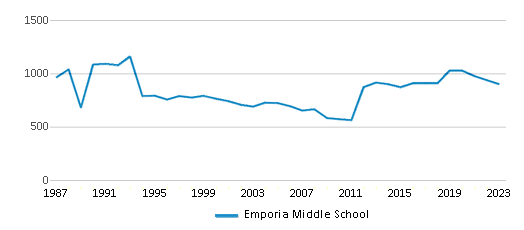
Gender %
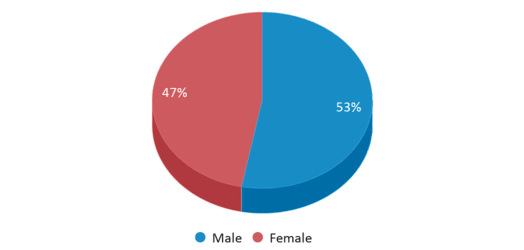
Total Classroom Teachers
65 teachers
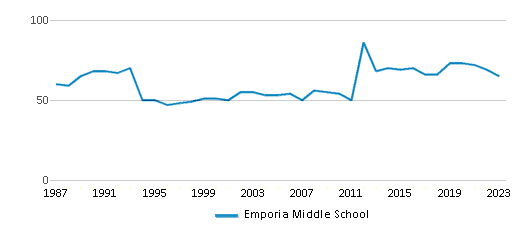
Students by Grade
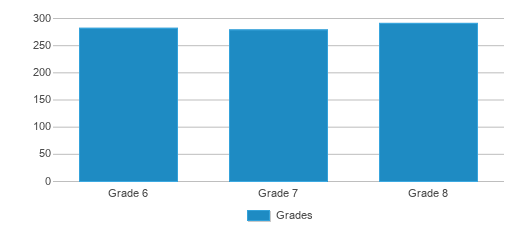
School Rankings
Emporia Middle School ranks within the bottom 50% of all 1,280 schools in Kansas (based off of combined math and reading proficiency testing data).
The diversity score of Emporia Middle School is 0.57, which is equal to the diversity score at state average of 0.57. The school's diversity has stayed relatively flat over five school years.
Overall Testing Rank
#1101 out of 1280 schools
(Bottom 50%)
(Bottom 50%)
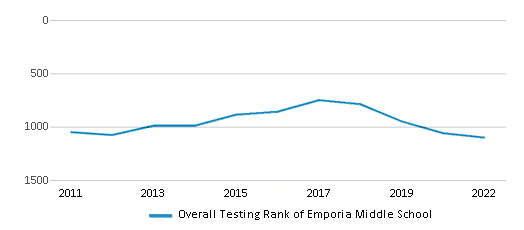
Math Test Scores (% Proficient)
14%
29%
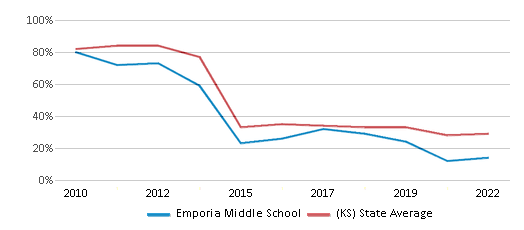
Reading/Language Arts Test Scores (% Proficient)
21%
32%
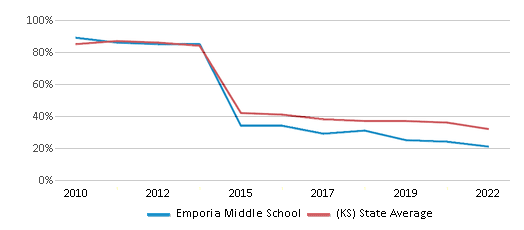
Science Test Scores (% Proficient)
17%
31%
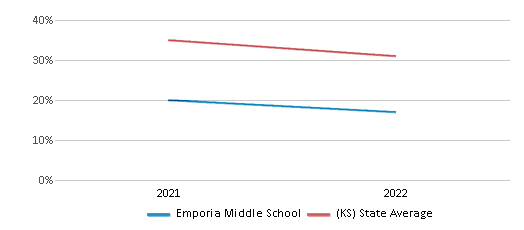
Student : Teacher Ratio
13:1
13:1
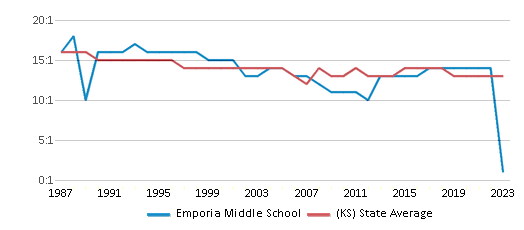
American Indian
n/a
1%
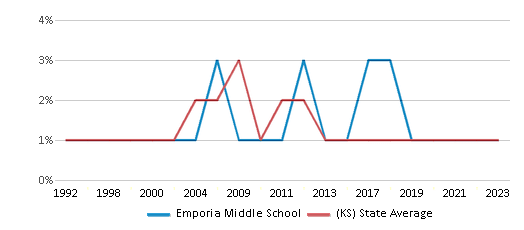
Asian
1%
3%
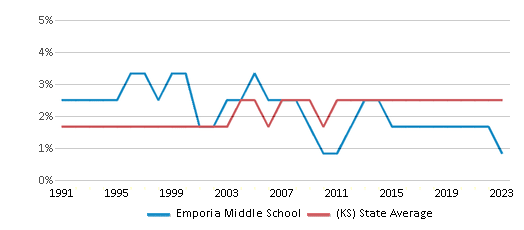
Hispanic
44%
22%
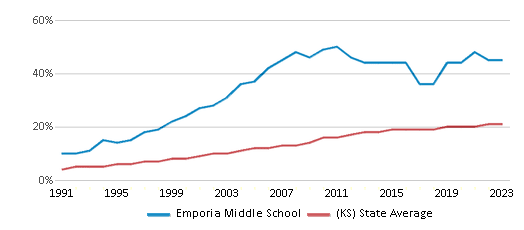
Black
n/a
7%
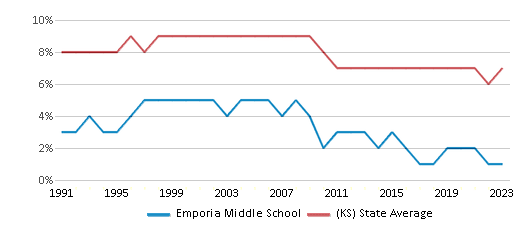
White
49%
61%
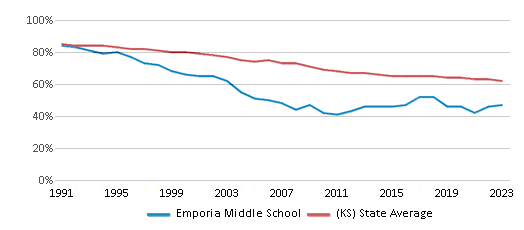
Hawaiian
n/a
n/a
Two or more races
6%
6%
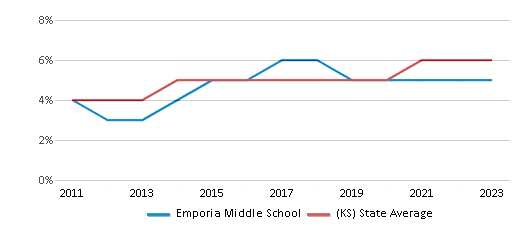
All Ethnic Groups
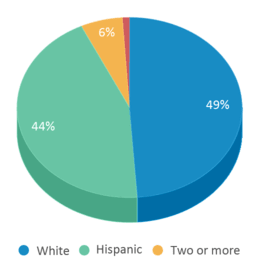
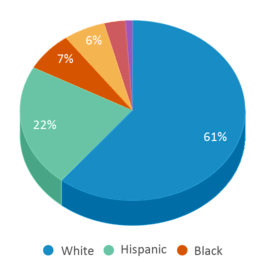
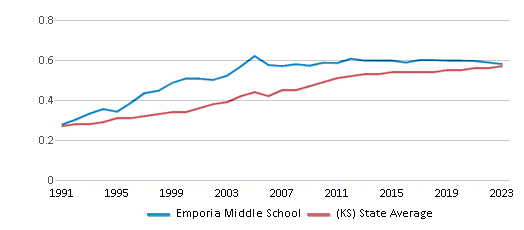
Participates in the National School Lunch Program (NSLP)
Yes
Eligible for Free Lunch
52%
42%
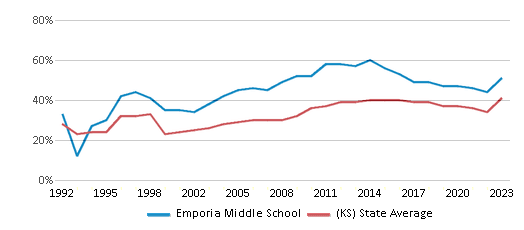
Eligible for Reduced Lunch
10%
7%
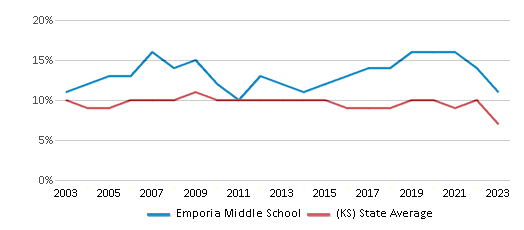
School Statewide Testing
School District Name
Source: National Center for Education Statistics (NCES), KS Dept. of Education
Profile last updated: 02/09/2025
Frequently Asked Questions
What is Emporia Middle School's ranking?
Emporia Middle School is ranked #1101 out of 1,280 schools, which ranks it among the bottom 50% of public schools in Kansas.
What percent of students have achieved state testing proficiency in math and reading?
14% of students have achieved math proficiency (compared to the 29% KS state average), while 21% of students have achieved reading proficiency (compared to the 32% KS state average).
How many students attend Emporia Middle School?
852 students attend Emporia Middle School.
What is the racial composition of the student body?
49% of Emporia Middle School students are White, 44% of students are Hispanic, 6% of students are Two or more races, and 1% of students are Asian.
What is the student:teacher ratio of Emporia Middle School?
Emporia Middle School has a student ration of 13:1, which is equal to the Kansas state average of 13:1.
What grades does Emporia Middle School offer ?
Emporia Middle School offers enrollment in grades 6-8
What school district is Emporia Middle School part of?
Emporia Middle School is part of Emporia School District.
School Reviews
4 5/6/2021
Some staff are in cliques, but for the most part are very supportive and friendly. The administration is both helpful and hurtful, mostly due to lack of follow through on their part when it comes to discipline and teacher support. The students are fairly undisciplined, so not having the support of administration on discipline is difficult. Overall, though, I loved working at this school, made many dear friends with my coworkers, and taught some incredible students! I will miss EMS dearly.
5 8/27/2020
This is the best school I ever been here, and if you speak any less of it, I swear it's on sight. The students here are snakes, especially the lime team in 6th grade. Green team is the best two.
2 4/10/2012
The teachers here are incredibly dedicated and take their time to get to know students. Unfortunately, the administration is extremely rigid and self-serving, which takes its toll on the teachers and students. There are too many different rules and programs for anyone to follow all of them, and the district doesn't seem to care to make positive changes. If you're planning on moving to this area, be very careful about choosing your school district. USD 253 can be a very harsh place for students, and you won't find a lot of support as a parent. Take the time to look at the other rural districts in the area before you settle on Emporia Public Schools.
Review Emporia Middle School. Reviews should be a few sentences in length. Please include any comments on:
- Quality of academic programs, teachers, and facilities
- Availability of music, art, sports and other extracurricular activities
Recent Articles

How Scaffolding Could Change the Way Your Child Learns
This article explores the concept of instructional scaffolding, a teaching method that enhances learning by breaking down complex tasks into manageable parts. It highlights how scaffolding supports students in developing critical thinking skills and becoming more independent learners. The article discusses the benefits of scaffolding, including improved engagement and reduced anxiety, and provides strategies for its implementation across various educational levels.

The Impact of Coronavirus on Public Schools
This article discusses the widespread impact of COVID-19 on public schools, addressing issues such as school closures, remote learning challenges, effects on standardized testing, and concerns about student progress. It also provides tips for parents suddenly faced with homeschooling responsibilities.

February 05, 2025
Understanding the U.S. Department of Education: Structure, Impact, and EvolutionWe explore how the Department of Education shapes American education, from its cabinet-level leadership to its impact on millions of students, written for general audiences seeking clarity on this vital institution.









